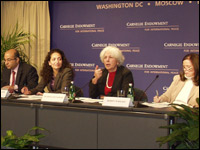Registration
You will receive an email confirming your registration.
IMGXYZ831IMGZYXSenior Associate Marina Ottaway and former Associate Julia Choucair-Vizoso of the Middle East program launched their new book Beyond the Façade: Political Reform in the Arab World. Samer Shehata, Assistant Professor of Arab Politics at Georgetown University participated in the discussion. Robin Wright from the Washington Post was moderator.
Following a short introduction by Wright, Marina Ottaway agreed that the contemporary discourse on democratic transformation in the Arab world often lacks a critical assessment of the kind of progress that is taking place on the ground.
There is a drive for change in the region because countries have been outgrowing their political systems, especially in the Gulf region, which has been experiencing considerable economic liberalization over the past few years. Even ruling regimes have been sensing the need to address the issue of political reform.
Ottaway explained that an important step in assessing Arab political reform is the clarity of the term. She contended that the book relies on the notion that political reform means a redistribution of power from the center. In view of that definition, and based on the ten case studies which Beyond the Façade presents, the answer to whether political reform has taken place in the Arab world is an unequivocal “No”.
This does not imply that nothing has happened on the political front in the Arab world during the past few years. Certainly, an important development has been the introduction of representative institutions in some Arab states. Nevertheless, even if these institutions disappeared tomorrow, the outcome of the political process in these countries would not change much. Naturally, this reality leads many to believe that these top-down reforms that have been introduced in recent years are simply façades that are meant to diffuse popular discontent and international pressure.
For her part, Chocair discussed the diversity of Arab reform experiences. Countries like Saudi Arabia and Syria have restrictive political environments in which reform has been stagnant because of the domination of a strong authoritarian center. Palestine and Lebanon on the other hand present a different paradigm in which democratic progress has been significant but has been hurt by the weakness of governing institutions and the persistence of unresolved national predicaments. Other countries like Jordan, Morocco, and Kuwait have witnessed important improvements in the past few years but these did not include power redistribution. Furthermore, progress has proven to be reversible.
Shehata commended the book for bridging the gap between academic insights and policy recommendations. He then discussed the issue of top-down reform and questioned its viability in light of the fact that, by and large, historical experience demonstrates that authoritarian rulers rarely opt to voluntarily relinquish power. Shehata also emphasized that any meaningful discussion about democratization in the Arab world cannot materialize without taking into consideration the role of Islamists in the region.
Audience members questioned whether political reform efforts would have been more successful had Arab states adopted economic agendas that allowed for larger segments of the population to grow and prosper. Ottaway agreed with this assessment, and stated that economic progress on all levels helps the prospects of participation. Others asked about the role of technology in involving younger Arabs in the political process. Choucair said that technology has been a major factor in raising political awareness in different parts of the Arab world, but has not been used effectively to mobilize the public.
